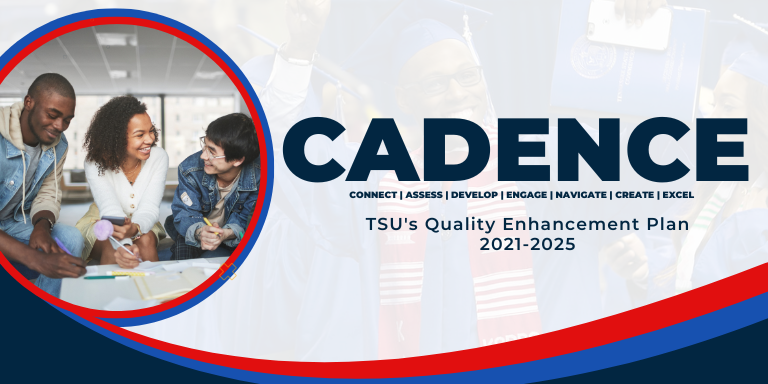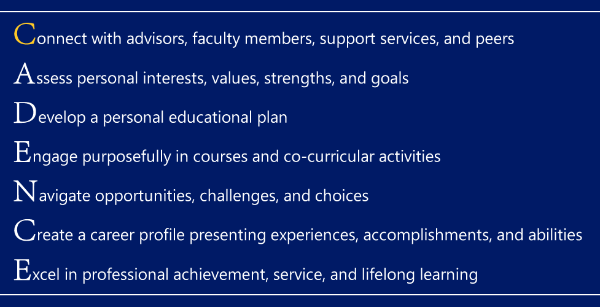|

Kimi Bonner, Director
kbonner7@tnstate.edu
Kay Gaines, Administrative Assistant
kgaines@tnstate.edu
For more information contact:
CADENCE Office
229 Brown-Daniel Library
https://www.tnstate.edu/qep/
(615) 963-4999
Quality Enhancement Plan
Tennessee State University’s 2021-2026 Quality Enhancement Plan - titled CADENCE (Connect → Assess → Develop → Engage → Navigate → Create → Excel) - seeks to promote student success through holistic, integrative advising, including improved utilization of academic and student support resources and the integration of educational and career planning.
CADENCE implements an expanded concept of academic advising that goes beyond course selection and registration, providing coordinated support for students in the major educational decisions and activities essential for their success. CADENCE focuses on ensuring that students connect with institutional resources early in their matriculation, develop an educational plan, engage purposefully in curricular and co-curricular opportunities, and apply educational experiences toward life and career goals.
As an acronym, CADENCE stands for vital steps in a student’s educational journey that are supported by effective advising:

CADENCE Initiatives
- Institutionalize an advising Coordinated Care Network.
The Coordinated Care Network is a networking model for advising and student support developed by the Education Advisory Board (EAB) and supported at its member institutions by the advising platform EAB Navigate.
Building on the University’s current use of EAB Navigate, CADENCE institutionalizes and expands the University’s Coordinated Care Network, deepening its connection of advising, academic, and student support units. CADENCE provides an ongoing leadership structure for the Coordinated Care Network through the CADENCE Steering Committee and promotes its effectiveness through regular professional development and through technical training and support.
- Publish and maintain comprehensive advising resources online.
CADENCE recognizes the critical importance of comprehensive, current, and accessible advising resources for the effectiveness of the Coordinated Care Network and for the successful participation of students in educational planning, co-curricular engagement, and other components of the plan.
CADENCE provides for the collection, review, and publication of existing advising resources in a single online location during the first year of implementation followed by the regular review, revision, and expansion of these resources. New advising resources planned as a part of CADENCE include timelines - modeled in part on EAB’s Experiential Major Maps - identifying opportunities for engagement and career development at specific milestones during a student’s matriculation.
- Utilize technology for individualized advising and career development.
CADENCE realizes for students the full benefits of three technology platforms already operational and in use at the University: EAB Navigate, Tiger Print, and Handshake.
CADENCE expands the use of EAB Navigate as a primary resource of the Coordinated Care Network in providing and documenting holistic, individualized advising; the use of Tiger Print for documenting educational planning and co-curricular engagement; and the use of Handshake for the creation and review of student career profiles. The plan provides for student access to these platforms from a single online location.
CADENCE Learning Outcomes
CADENCE recognizes advising as a teaching and learning process with a defined curriculum and learning goals. CADENCE initiatives are designed to support students in developing educational plans, based on defined personal and career goals, by the end of their first semester, and in creating career profiles, drawing effectively on their educational experiences, by the final semester of their degree program.
These educational plans and career profiles provide an opportunity for students to demonstrate the achievement of CADENCE’s two stated learning outcomes:
- Educational Planning: Students will be able to develop and utilize educational plans based on defined personal and career goals.
- Integration and Reflection: Students will be able to articulate and document the significance of curricular and co-curricular experiences in the achievement of defined personal and career goals.
The first outcome is captured in the first part of the CADENCE acronym (Connect, Assess, Develop), with the second reflected in the words of the last four letters (Engage, Navigate, Create, Excel).
|